Base Camp Lesson Choices
The Outdoor Classroom’s lessons in ecology and natural history are a dynamic blend of hands/minds-on activities through which students study coastal and terrestrial eco-systems. Utilizing a combination of classroom and field methods, small teams of students investigate ecological and biological concepts and reflect on their relationship to the natural world. We emphasize self-guided inquiry, careful observation, scientific measurement, and the use of journals for recording, writing, and drawing. Our instructors tailor each lesson to enhance the visiting school’s curriculum and to match the age and experience level of every group.
Estuary Study
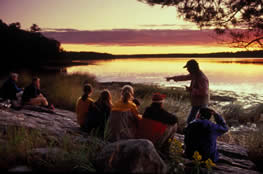 Our 75 acres of estuarine marsh are a rich resource for exploring concepts such as adaptation and limiting factors and for developing an appreciation of botany. Lessons frequently include water testing, plot studies, use of plant-identification field guides, and discussions of coastal development issues. A salt marsh study by canoe is also available.
Our 75 acres of estuarine marsh are a rich resource for exploring concepts such as adaptation and limiting factors and for developing an appreciation of botany. Lessons frequently include water testing, plot studies, use of plant-identification field guides, and discussions of coastal development issues. A salt marsh study by canoe is also available.
Pond Study
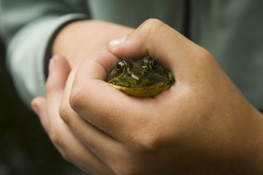 Each of our small ponds, bogs, and vernal pools contains a diverse and vibrant community of plants and animals. They are perfectly situated for comparative studies of biotic and abiotic factors. Lesson topics may focus on fundamental concepts, such as the water cycle, or delve into more complex subjects, such as insect specialization and water-quality monitoring.
Each of our small ponds, bogs, and vernal pools contains a diverse and vibrant community of plants and animals. They are perfectly situated for comparative studies of biotic and abiotic factors. Lesson topics may focus on fundamental concepts, such as the water cycle, or delve into more complex subjects, such as insect specialization and water-quality monitoring.
Animal Study
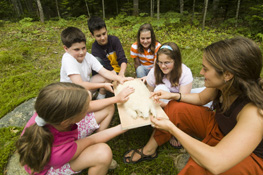 Examining animal behavior and structure is an excellent way to illustrate a wide range of ecological principles, such as habitat, niche interrelationships, and food webs. In a typical lesson, students carefully examine prepared taxidermy mounts, reporting to the group what they have found, and then conducting field observations in the surrounding forest.
Examining animal behavior and structure is an excellent way to illustrate a wide range of ecological principles, such as habitat, niche interrelationships, and food webs. In a typical lesson, students carefully examine prepared taxidermy mounts, reporting to the group what they have found, and then conducting field observations in the surrounding forest.
Group Challenges
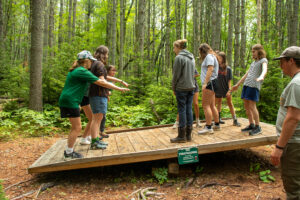 Thriving school communities are sustained when students have confidence, trust, and excellent group communication skills. Outdoor Classroom instructors use a combination of hands-on games, team problem-solving and activities on ground-based Challenge Course elements to facilitate group bonding throughout the program.
Thriving school communities are sustained when students have confidence, trust, and excellent group communication skills. Outdoor Classroom instructors use a combination of hands-on games, team problem-solving and activities on ground-based Challenge Course elements to facilitate group bonding throughout the program.
High Elements
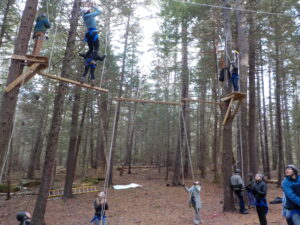 Students take what they have learned during the Group Challenges activity block and transfer that understanding of group dynamics and the role they play in it to the high elements on Chewonki’s Challenge Course. Each group will have the opportunity to climb one high-element. All elements require teamwork and communication. Groups must first complete a Group Challenges block.
Students take what they have learned during the Group Challenges activity block and transfer that understanding of group dynamics and the role they play in it to the high elements on Chewonki’s Challenge Course. Each group will have the opportunity to climb one high-element. All elements require teamwork and communication. Groups must first complete a Group Challenges block.
Farm & Food Systems
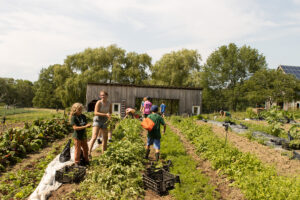 Of all the inputs and outputs that sustain a community, few are more interesting or important than the food we eat, and the intricate web of relationships that connect the farm-to-plate. Your students will have the opportunity to tour the fields and pastures, meet the animals, see, feel, and eat some of the “food & fiber” produced at Chewonki, and learn more about our approach to recycling, reducing food waste, and stewardship of the land through a work project with the farmers.
Of all the inputs and outputs that sustain a community, few are more interesting or important than the food we eat, and the intricate web of relationships that connect the farm-to-plate. Your students will have the opportunity to tour the fields and pastures, meet the animals, see, feel, and eat some of the “food & fiber” produced at Chewonki, and learn more about our approach to recycling, reducing food waste, and stewardship of the land through a work project with the farmers.
Rocky Shore Study
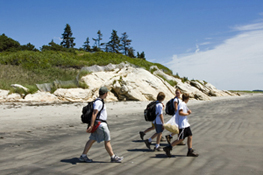 The dynamic intertidal zones of the rocky shore are as well suited to ecological investigation as they are exciting to explore. This is an area rich in specialized plants and animals, shaped by the forces of geology and astronomy. Rocky shore lessons are conducted at nearby, off-site areas and often incorporate transects, use of field guides, creative dramatics, and discussions of tidal forces, plate tectonics, and marine resource issues.
The dynamic intertidal zones of the rocky shore are as well suited to ecological investigation as they are exciting to explore. This is an area rich in specialized plants and animals, shaped by the forces of geology and astronomy. Rocky shore lessons are conducted at nearby, off-site areas and often incorporate transects, use of field guides, creative dramatics, and discussions of tidal forces, plate tectonics, and marine resource issues.
Live Animal Presentation
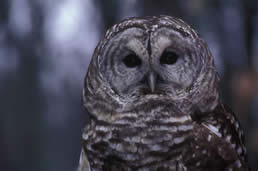 Chewonki’s Traveling Natural History department offers numerous hour-long presentations that can be incorporated into any residential program. Often used as an evening activity for an entire visiting class, these programs are a unique opportunity for students to see and learn about a wide variety of living wildlife, from woodchucks to salamanders to owls.
Chewonki’s Traveling Natural History department offers numerous hour-long presentations that can be incorporated into any residential program. Often used as an evening activity for an entire visiting class, these programs are a unique opportunity for students to see and learn about a wide variety of living wildlife, from woodchucks to salamanders to owls.



